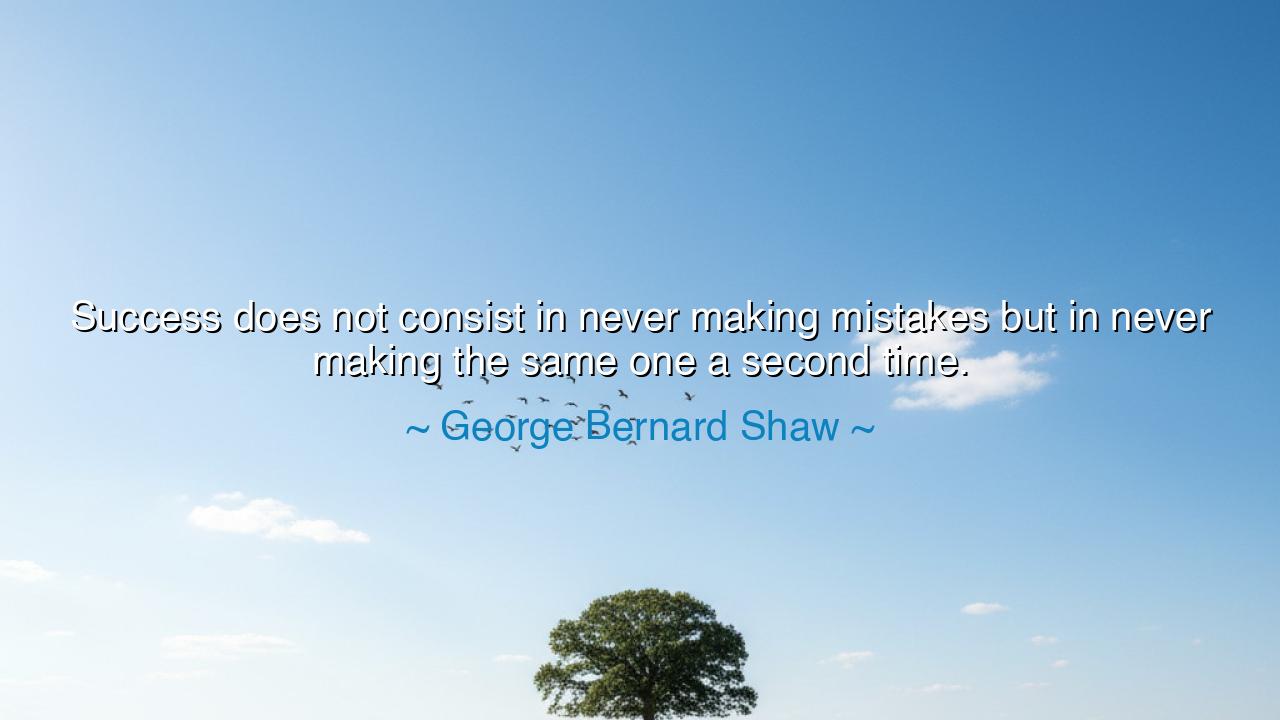
Success does not consist in never making mistakes but in never
Success does not consist in never making mistakes but in never making the same one a second time.






Hear now the wisdom of George Bernard Shaw, who declared: “Success does not consist in never making mistakes but in never making the same one a second time.” This truth, simple yet profound, strikes at the heart of human striving. For who among mortals has walked the path of life without stumbling? Who has taken up the sword of ambition without once being cut by its edge? Mistakes are the common lot of all men, but Shaw proclaims that true success is not found in their absence, but in the strength to learn, to rise, and to move forward with greater wisdom.
When he speaks of mistakes, he strips away the illusion of perfection. Too often men and women imagine that greatness belongs to those who walk flawlessly, who never falter, who march without error from victory to victory. Yet Shaw unmasks this lie. The greatest inventors, the mightiest leaders, the noblest artists—all erred, all failed, all tasted the bitterness of defeat. Their power was not in avoiding error, but in transforming error into teacher, failure into guide, and weakness into strength.
The heart of his counsel is this: do not commit the same error twice. To stumble once may be the fault of circumstance; to stumble twice upon the same stone is the fault of blindness. Life is a stern teacher, but it is also merciful, granting lessons with every fall. The wise gather these lessons and change their steps; the foolish repeat their folly until ruin overtakes them. Thus, the road to success is paved not by perfection, but by remembrance, humility, and growth.
History testifies to this truth. Consider the voyages of Christopher Columbus. His first journey across the ocean was filled with misjudgments—he believed he had found the Indies when in truth he had stumbled upon a new world. Yet he learned from his errors, corrected his course, and returned with greater clarity, opening the way for exploration that transformed history. His greatness was not in flawless vision, but in refusing to let repeated error blind his destiny.
Or recall the tale of Thomas Edison, who in his pursuit of the electric light endured thousands of failed experiments. When asked of his failures, he declared he had not failed, but discovered many ways that would not work. Each error was a lesson; none was wasted, for none was repeated. In this persistence lay the secret of his triumph. Thus we see Shaw’s wisdom incarnate: the man who learns from his mistakes advances; the man who repeats them remains chained.
O children of tomorrow, take this teaching to heart: do not fear your mistakes. Fear only the blindness that refuses to learn from them. Each fall is an opportunity to rise stronger; each wound a chance to gain wisdom. Write your errors upon the tablets of memory, and let them guide your steps into better paths. Let no pride keep you from acknowledging them, for humility is the gate through which wisdom enters.
Let your practice be this: when you falter, pause and reflect. Ask yourself, “What has this failure taught me? How must I change my path so that I do not stumble here again?” Make correction swiftly, and let each mistake become the foundation of future victory. In time, you will find that your life, though filled with errors, shines with the light of wisdom hard-won and deeply lived.
So remember Shaw’s words: success is not the absence of mistakes, but the absence of repeated folly. To err is human, but to rise wiser from error is divine. Embrace this truth, live it boldly, and you shall find that even your failures are but hidden steps upon the stairway of triumph.






AAdministratorAdministrator
Welcome, honored guests. Please leave a comment, we will respond soon